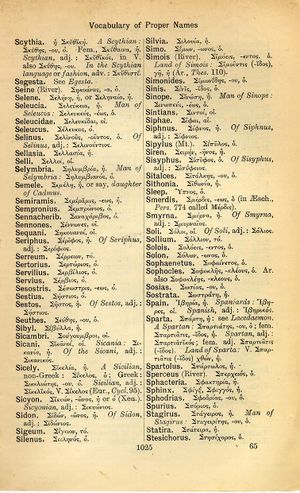Sestos
Γυναῖκα θάπτειν κρεῖσσόν ἐστιν ἢ γαμεῖν → Sepelire satius feminam quam ducere → Ein Weib bestatten, besser ist's als heiraten
English > Greek (Woodhouse)
Σῆστος, ἡ.
Of Sestos, adj.: Σήστιος.
Latin > English (Lewis & Short)
Sēstos: (-us), i, f., = Σηστός,
I a city in Thrace, on the Hellespont, opposite Abydos, the residence of Hero: Leandri amore pernobilis, Mel. 2, 2, 7; Plin. 4, 11, 18, § 49; Liv. 32, 33; 37, 9; Ov. H. 18, 127; Luc. 2, 674; 6, 55.—Hence,
A Sēstĭăcus, a, um, adj., of or belonging to Sestos, Sestian: sinus, i.e. the Hellespont, Stat. S. 1, 3, 27: pelagus, Aus. Idyll. 10, 287.—
B Sēstus, a, um, adj., of Sestos, Sestian: puella, i.e. Hero, Ov. H. 17 (18), 2 dub. (the first two lines are probably spurious).—
C Sē-stĭăs, ădis, f., the Sestian, i.e. Hero, Stat. Th. 6, 547; Sid. Carm. 11, 71.
Latin > French (Gaffiot 2016)
Sēstŏs (-us), ī, f. (Σηστός), ville de Thrace, en face d’Abydos [v. légende de Héro et Léandre] : Plin. 4, 49.
Latin > German (Georges)
Sēstos u. Sēstus, ī, f. (Σηστός), eine Stadt in Thrazien am Hellespont, Wohnort der Hero (s. Ov. her. 17 u. 18), nach Reichard j. Jalova, Mela 2, 2. 7 (2. § 26). Liv. 32, 33, 7. Lucan. 2, 674. – Dav.: A) Sēstiacus, a, um (Σηστιακός), sestiacisch, Stat. u. Auson. – B) Sēstias, adis, f. (Σηστιάς), die Sestierin = Hero, Stat. u. Sidon. – C) Sēstus, a, um, aus Sestos, sestisch, puella, Hero, Ov. her. 17 (18), 2 (Ehwald liest Sesti puella).

